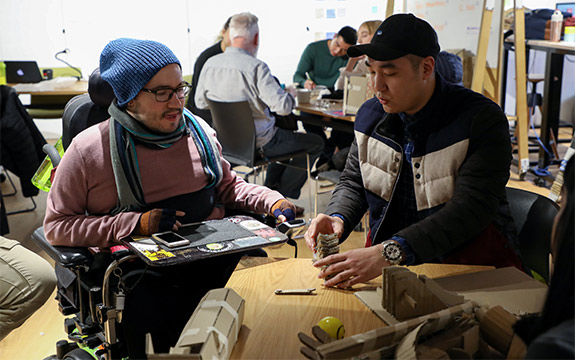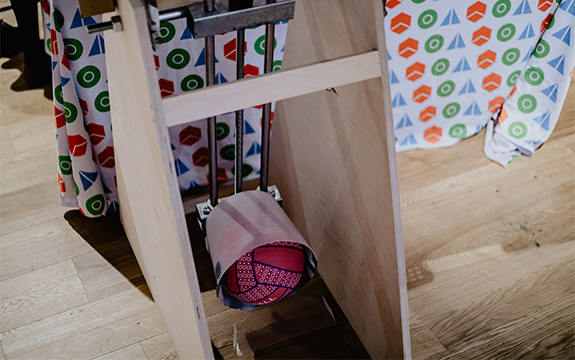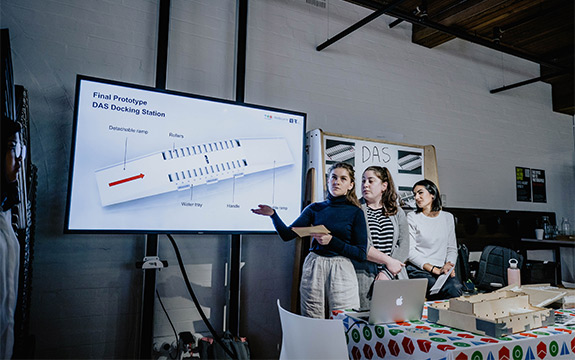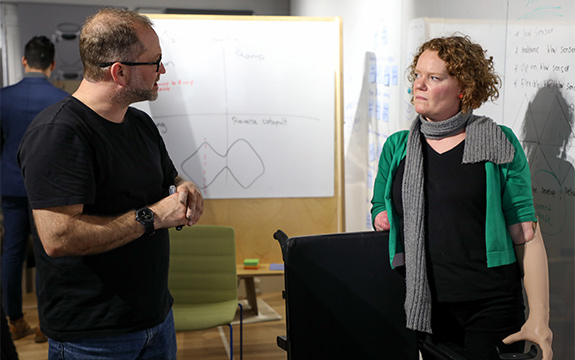TOM @ University outcomes to be developed at Swinburne

In Summary
- Occupational health and design student teams investigate daily challenges of people with disabilities
- Three outcomes to be further developed by the Swinburne Engineering Practice Academy
Teams of makers and people with disabilities from TOM @ University, an initiative of Tikkun Olam Makers, presented their final solutions last month at Swinburne. TOM Need Knowers (people with disabilities), Master of Occupational Therapy students and Design Honours and Master students at the Design Factory Melbourne joined forces over 12 weeks to create inspiring results.
Three of the outcomes will be further developed by the Swinburne Engineering Practice Academy for undergraduate engineering students.
“The TOM @ Uni program provided occupational therapy and design students the opportunity to work on a real problem alongside an individual, enabling them to gain inspiration and empathy, go through the ideation process and see the impact of their solutions first hand. For many students, what was believed to be impossible or unachievable has now become a reality. They are now equipped with the practical skills to create real impact with their clients, the community and within society,” says Ben Shemesh, Manager of Innovation and Development, Tikkun Olam Makers.
“The student teams truly looked into the daily challenges Need Knowers were facing, gained valuable insights and produced great outcomes,” says Pauliina Mattila, Strategist, Design Factory Melbourne.
Two teams working with Need Knower, wheelchair user Jules, to develop a better way for him to play bowls, and the wheelchair cleaning team with Need Knower, Mandy, have been selected to continue on with the Engineering Practice Academy.
Jules uses his hands to operate a joystick to power his wheelchair. In order to play indoor bowls he needs a device clamped to his wheelchair with guidance and actuation to allow him to play and participate.
“I enjoyed working with the students to find out what their ideas were to help me achieve my goals of playing ten-pin bowling. It may have been a good idea to meet up with the students while they were working on the prototypes so I could offer them more ideas during the process. I’m very excited with the prospect of production in the next steps. I’m sure the next group of students will do a great job with the prototypes the Swinburne students came up with,” says Jules.
Two teams worked on creating new, enjoyable bowling experiences for Jules. They developed two ideas, a ‘bowling canon’ and a ‘bowling arm’ that will be scaled to help this happen.
 Model of the ‘bowling arm’ idea for Jules’ indoor bowling.
Model of the ‘bowling arm’ idea for Jules’ indoor bowling.
Mandy is a quadruple amputee. Her challenge is to clean six wheels on her wheelchair. Students developed a wheelchair cleaning device idea that cleans her wheelchair independently using the power from her wheelchair to drive a cleaning mechanism.
 Students presenting the wheelchair wheel washing docking station for Mandy.
Students presenting the wheelchair wheel washing docking station for Mandy.
 Mandy and her husband Rod working on an idea to clean wheelchair wheels at Swinburne.
Mandy and her husband Rod working on an idea to clean wheelchair wheels at Swinburne.
The final ideas from the TOM @ University program are open source, documented and presented as working models, with a focus on the value they provide to the participating Need Knowers.
For more information contact dfm@swin.edu.au +61 3 9214 6101

